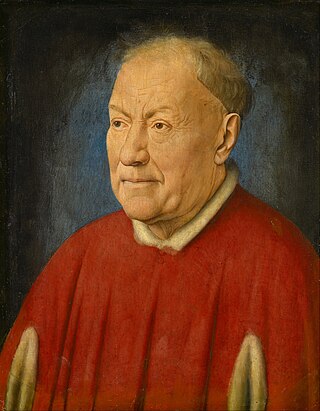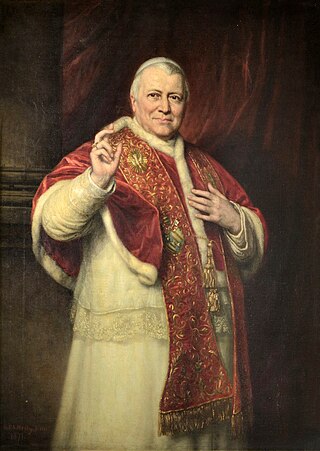Related Research Articles

The Council of Constance was an ecumenical council of the Catholic Church that was held from 1414 to 1418 in the Bishopric of Constance (Konstanz) in present-day Germany. This was the first time that an ecumenical council was convened in the Holy Roman Empire. The council ended the Western Schism by deposing or accepting the resignation of the remaining papal claimants and by electing Pope Martin V. It was the last papal election to take place outside of Italy.

An oath of office is an oath or affirmation a person takes before assuming the duties of an office, usually a position in government or within a religious body, although such oaths are sometimes required of officers of other organizations. Such oaths are often required by the laws of the state, religious body, or other organization before the person may actually exercise the powers of the office or organization. It may be administered at an inauguration, coronation, enthronement, or other ceremony connected with the taking up of office itself, or it may be administered privately. In some cases it may be administered privately and then repeated during a public ceremony.

The pope is the bishop of Rome and the visible head of the worldwide Catholic Church. He is also known as the supreme pontiff, Roman pontiff, or sovereign pontiff. From the eighth century until 1870, the pope was the sovereign or head of state of the Papal States, and since 1929 of the much smaller Vatican City state. The reigning pope is Francis, who was elected on 13 March 2013. From a Catholic viewpoint, the primacy of the bishop of Rome is largely derived from his role as the apostolic successor to Saint Peter, to whom primacy was conferred by Jesus, who gave Peter the Keys of Heaven and the powers of "binding and loosing", naming him as the "rock" upon which the Church would be built.

The Council of Florence is the seventeenth ecumenical council recognized by the Catholic Church, held between 1431 and 1449. It was covened in territories under the Holy Roman Empire. Italy became a venue of a Catholic ecumenical council after a gap of about 2 centuries. It was convoked as the Council of Basel by Pope Martin V shortly before his death in February 1431 and took place in the context of the Hussite Wars in Bohemia and the rise of the Ottoman Empire. At stake was the greater conflict between the conciliar movement and the principle of papal supremacy.
The Oath Against Modernism was instituted by Pope Pius X in his motu proprioSacrorum antistitum on September 1, 1910. The oath was required of "all clergy, pastors, confessors, preachers, religious superiors, and professors in philosophical-theological seminaries" of the Catholic Church. It remained in force until the Congregation for the Doctrine of the Faith, with the approval of Paul VI, replaced it with a revised Profession of Faith on July 17, 1967.

The magisterium of the Catholic Church is the church's authority or office to give authentic interpretation of the word of God, "whether in its written form or in the form of Tradition". According to the 1992 Catechism of the Catholic Church, the task of interpretation is vested uniquely in the Pope and the bishops, though the concept has a complex history of development. Scripture and Tradition "make up a single sacred deposit of the Word of God, which is entrusted to the Church", and the magisterium is not independent of this, since "all that it proposes for belief as being divinely revealed is derived from this single deposit of faith."
Universi Dominici gregis is an apostolic constitution of the Catholic Church issued by Pope John Paul II on 22 February 1996. It superseded Pope Paul VI's 1975 apostolic constitution, Romano Pontifici eligendo, and all previous apostolic constitutions and orders on the subject of the election of the pope.

A papal conclave is a gathering of the College of Cardinals convened to elect a bishop of Rome, also known as the pope. Catholics consider the pope to be the apostolic successor of Saint Peter and the earthly head of the Catholic Church.
A papal renunciation also called a papal abdication, occurs when the current pope of the Catholic Church voluntarily resigns his position. As a pope's time in office has conventionally lasted from his election until his death, a papal renunciation is an uncommon event. Before the 21st century, only five popes unambiguously resigned with historical certainty, all between the 10th and 15th centuries. Additionally, there are disputed claims of four popes having resigned, dating from the 3rd to the 11th centuries; a fifth disputed case may have involved an antipope.

The Oath of Allegiance is a promise to be loyal to the British monarch, and their heirs and successors, sworn by certain public servants in the United Kingdom, and also by newly naturalised subjects in citizenship ceremonies. The current standard wording of the oath of allegiance is set out in the Promissory Oaths Act 1868.
The Liber Diurnus Romanorum Pontificum includes a formula of profession of faith that a newly elected Pope sent to the representative at Ravenna of the Emperor of Constantinople soon after the Third Council of Constantinople (680–681), which is referred to in the text as held "recently".
Capital punishment in Vatican City was legal between 1929 and 1969, reserved for attempted assassination of the Pope, but has never been applied there. Executions were carried out elsewhere in the Papal States, which was the predecessor of the Vatican City, during their existence.

Niccolò Albergati was an Italian Carthusian and a prelate of the Roman Catholic Church. He was appointed cardinal and served as a papal diplomat to France and England (1422–23) in addition to serving as the bishop of Bologna from 1417 until his death.
The papal deposing power was the most powerful tool of the political authority claimed by and on behalf of the Roman Pontiff, in medieval and early modern thought, amounting to the assertion of the Pope's power to declare a Christian monarch heretical and powerless to rule.
The term dogmatic fact is employed in the teaching of the Catholic Church, to mean any fact connected with a dogma, wherein the application of the dogma is itself what constitutes, or more accurately canonizes, the fact.

Papal infallibility is a dogma of the Catholic Church which states that, in virtue of the promise of Jesus to Peter, the Pope when he speaks ex cathedra is preserved from the possibility of error on doctrine "initially given to the apostolic Church and handed down in Scripture and tradition". It does not mean that the pope cannot sin or otherwise err in some capacity, though he is prevented by the assistance of the Holy Spirit from issuing heretical teaching even in his non-infallible Magisterium, as a corollary of indefectibility. This doctrine, defined dogmatically at the First Vatican Council of 1869–1870 in the document Pastor aeternus, is claimed to have existed in medieval theology and to have been the majority opinion at the time of the Counter-Reformation.

Amadeus VIII, nicknamed the Peaceful, was Count of Savoy from 1391 to 1416 and Duke of Savoy from 1416 to 1440. He was a claimant to the papacy from 1439 to 1449 as Felix V in opposition to Popes Eugene IV and Nicholas V.
A profession of faith is a personal and public statement of a belief or faith.
Execrabilis is a papal bull issued by Pope Pius II on 18 January 1460 condemning conciliarism. The bull received its name from the opening word of its Latin text, which labelled as "execrable" all efforts to appeal an authoritative ruling of a Pope to a council.
References
- 1 2 "Council of Basel (1431–1445)". Eternal Word Television Network . Retrieved 2007-02-27.
- ↑ Aeneas Sylvius Piccolominus (Pius II) (1992). Wilfrid Kirk Smith, Denys Hay (ed.). De Gestis Concilii Basiliensis Commentariorvm. Oxford University Press. pp. xix. ISBN 0-19-822201-7.